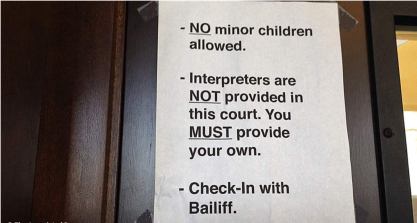One of the main worries about being a court translator is that the smallest mistake in translation could mean injustice at a catastrophic level. With a legal requirement of the state to provide an interpreter, it is crucial that the chosen interpreter has the ability and experience level to make accurate translations in the correct context, however, this is not always the case as in many situations, states choose to ignore these requirements.
in translation could mean injustice at a catastrophic level. With a legal requirement of the state to provide an interpreter, it is crucial that the chosen interpreter has the ability and experience level to make accurate translations in the correct context, however, this is not always the case as in many situations, states choose to ignore these requirements.
One case in which such a minor miswording came out incorrect was a court hearing in Virginia for a minor traffic violation. A man was accused of running a red light, his interpreter told him he was accused of a “violación,” which in Spanish does not mean “violation,” but “rape.” Clearly, the interpreter assignment was done incorrectly based on the court’s interpreter database. It is of the utmost importance for everyone’s benefit (lawyers, jury, judge, defendants and prosecutors) that the provided interpreter has the certifications, qualifications and experience necessary for the specific case.
 Although there are court rulings and an executive order requiring states to provide interpreters in all court settings, courts often ignore these rules. Especially in states where there is no centralized oversight. In the aforementioned article, there are a number of cases where courts fail to provide interpreters in many hearings. Now this is a problem that needs to be addressed sooner rather later.
Although there are court rulings and an executive order requiring states to provide interpreters in all court settings, courts often ignore these rules. Especially in states where there is no centralized oversight. In the aforementioned article, there are a number of cases where courts fail to provide interpreters in many hearings. Now this is a problem that needs to be addressed sooner rather later.
Instead of sanctioning the state and imposing orders / rulings, the root of the problem needs to be cured. A clear and defined scheduling system, a database of certified, qualified and experienced interpreters and a user-friendly interface would most certainly help in whatever issues the courts are facing. As increasing the easy access to these interpreters is certainly a step in the right direction.


 Regardless of your political affiliations, as a US citizen and eligible voter you
Regardless of your political affiliations, as a US citizen and eligible voter you